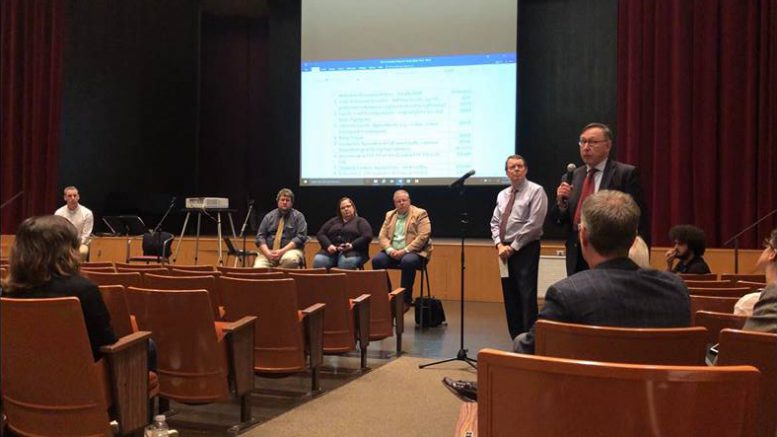By Cassandra Barrett ’19, editor-in-chief
College officials and members of the faculty task force facilitated an information session concerning impending academic cuts on Tuesday, Oct. 2, with the help of Student Government.
Those speaking on behalf of the College and task force included Michael Green, vice president of academic affairs and dean of the faculty; Deanna Dodson, professor of psychology; Grant Taylor, professor of art and visual culture; Walter Patton, associate professor of chemistry; Christopher Heffner, associate professor of music; Shawn Curtain, vice president of finance; and College President Lewis E. Thayne.
The task force is now in the process of working through the early retirement incentive phase of the proposal, and it anticipates that seven full-time faculty members will take the incentive, which will provide a savings positive of $300,000. In academic departments with more staff, some faculty members have indicated an interest in altering their appointments. These faculty members will reduce their full-time instruction to three quarters or half time.
Previously, the College had created a program to credit and reward faculty who facilitated student research opportunities, took on large advising roles, or went above and beyond their basic duties as faculty, according to Dean Green. In order to save faculty positions in light of the impending budgetary cuts, that program has been suspended.
The proposed budgetary cuts also includes the elimination and consolidation of some programs currently offered at the College. German, French, philosophy and religion majors are currently being considered for elimination at the College. Digital communications, global studies, international business and art and visual culture majors will potentially be restructured in order to attract more students to those majors, and ultimately to LVC.
Deanna Dodson explained that the task force has discussed the possibility of combining academic departments to better meet student interest. Dodson mentioned the potential to create a department of humanities, for example.
“One of the things we are considering, and this wasn’t part of the task force recommendations, is can we find a way to re-envision or maybe combine departments in a way that might lead to some of these new ideas and interdisciplinary programs,” Dodson said.
Dean Green said the College aims to align with student needs and allocate resources to programs that are most important for students.
“In the last five years, we’ve added 11 new programs, and those programs were a direct result of what we were hearing from prospective students and current students about the kinds of programs they wanted,” Green said. “We are looking all the time at ways in which we can restructure the academic program to better meet the needs of students.”
The College maintains its commitment to a liberal arts foundation and will continue to offer courses in religion and philosophy at the 100 and 200 levels. The task force hopes that by eliminating upper-level courses with low enrollment, professors will be more available to teach more courses in the Constellation program.
“We’re not walking away from these core liberal arts values,” Dodson said. “We’re trying to say how we can do this in a way that’s most efficient, that’s most effective and that can have an impact on the greatest number of students.”
Students present at the information session raised concerns about how the impending budgetary changes might affect student tuition. Shawn Curtain discussed that tuition is raised by a small percentage each year. Last year saw a 4 percent increase in tuition, and this year tuition was raised by 3.5 percent. Curtain looks to implement an increase of less than 3 percent for the 2019-2020 academic year. He explained that the tuition increases fund the operating budget, including health insurance, salary increases, utilities, licensing fees for software and technology costs, among other costs.
A student also shared his concern about the renovation of the pedestrian bridge and how that project might be affected. Curtain discussed that the renovation of the pedestrian bridge has already been accounted for and is estimated to cost $4 million. The cost of the bridge will partially be funded by the state, and the rest of the cost will be paid using money that had been reserved at the initiation of the renovation plan two years ago. The proposed academic cuts will not affect the bridge project.
President Thayne assured students that throughout this restructuring process, student experience has remained a primary focus.
“The reason we’re seeking reductions in the instructional budget and in non-instructional purchases and why the Board has asked the administration and faculty to work together on those is because we have substantially increased our financial aid,” President Thayne said. “Affordability and student experience has been our top priority.”
The final budgetary report will be submitted for an endorsement vote by the full faculty, scheduled to occur on Nov. 29 at the Faculty Business Meeting.
crb008@lvc.edu
